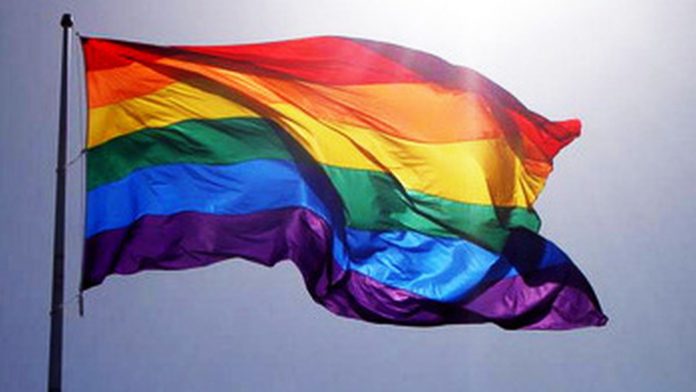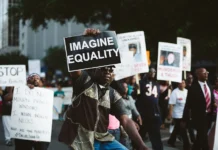It was an awkward moment. “Fr” Colin had led the LGBT activist movement in the Church of England for decades. Every General Synod he would be found picketing the bishops, clergy and lay people for LGBT rights, and the recognition of gay marriage. As I arrived at this series of meetings as a member of the Anglican Synod, I needed to set out to find him. I had something very difficult to do and I wasn’t looking forward to it.
He was flanked by a couple of enthusiastic lesbian friends pinning up the movement’s propaganda in their publicity corner. I approached him with a lump in my throat.
I put my hands on his shoulders and looked into his eyes affectionately. “Colin you know that I love you, don’t you?”
“Yes, of course I do” he said. “You’re one of the good guys.”
So I gave him a kiss on both cheeks and an affectionate hug and I said “please don’t forget that ever. Because I come to tell you we are both mistaken. We need to change our minds. It’s a metanoia moment that’s being asked of us – to repent. Colin we’ve both been wrong for a long time. My understanding of the whole gay narrative and its justification has changed; and I don’t want it to be thought that there is any animosity when I talk and write publicly about this change. Please don’t ever forget that I love you. But we are wrong; we both need to start again.”
Colin looked over his shoulder to the lesbians and a look of some anxiety came over his face. “Come over here. Gavin is having a nervous breakdown.”
And there lay the challenge. Which category do we operate in? Mad, bad or sad? The psychological, the spiritual and the ethical compete for our perceptions and allegiance.
I had travelled between different university Christian LGBT groups offering encouragement and support for some time.
So why the change?
I remember clearly my slow movement towards LGBT+ sympathy and then the growth into fully-fledged allegiance.
It began when I was a parish priest. There were two distinctive characteristics that shaped my theological thinking.
The first was that it was very hard to get people into Church in the first place. We were competing with a number of different ideologies, but at the top of the list was the culture of therapy. The language and culture of therapy told people that they were basically ”OK”. A famous much read book of the time was called “I’m OK – You’re OK.” It was all about self-acceptance. The language and the practice of the therapeutic culture was that everyone was acceptable just as they are without any preconditions. Self-acceptance was the task, and a whole industry emerged to sell people that message.
In Church, it became more and more obvious that this was part of our message too, and one people responded to. So we borrowed the self-affirming language of the therapeutic movement. God became the great therapist in the sky. He loved people just as they were too. You could come as you are. A little charismatic ditty of the time began, “Jesus take me as I am. I can come no other way.”
God became “Mr Nice”. A whole theological culture offering and celebrating the non-judgmental “Nice” was being born.
The background to all was affected by a shift in popular psychological perception. Towards the end of the Twentieth century Jung replaced Freud as ‘top-psychologist’ and mental map maker in the popular imagination. We moved from dismissing religion as a vehicle of neurosis to celebrating spirituality as a means of achieving the fulfilment of our multi-layered human potential.
Jung was all about something he called “individuation”. Never actually defined, it was summed up in what became a highly popular aspiration of providing a road map that enable each individual to fulfil their full potential. The counterpoint to this was that any restriction on people was interpreted as something that might stop this mysterious and undefined actualisation of the individual.
What on the Christian map was described as sin danger, became on this new map, a different kind of danger – a stunting restriction, a needless constraint which would restrict the journey towards the full achievement of potentiality. The very idea of sin as spiritual blockage became itself a psychological offence. The idea of sin itself was a psychological sin.
A second strand in the culture that gave impetus to the overthrow of the old order was the need to assess love in the language and arena of sexual longing and romantic attraction.
Eros was promoted from Valentine’s day to became top God all the year round.
Everyone needed love and the kind of love that was the most tangible was romance and sex. Love was Love. Except that Love, which could mean so many things, rather slyly and discreetly came to mean sex. Making love even became “having sex”.
Interest in sex grew swiftly into an obsession or an addiction. We were growing a new pantheon of Gods. Indulgence, affirmation and nice were joined by sex and romance.
A third element had to do with the absence of evil. The discovery of the reality of what had happened at Auschwitz in my teens had convinced me of the reality of evil and played some part in my journey towards the discovery of God. But I remember as a parish priest preparing homilies how awkward I found those parts of the Gospel where Jesus confronted demons and expelled them. What sense did this make for the average person in church in the second half of the 20th century?
The idea of the devil and the demonic had been made inaccessible to people. In part, Freud and psychiatry had peddled a fear and demonisation of religion; an association grew up between neurosis and the fear of repression and mental illness. It was easier to relegate the whole demonic experience of the New Testament to the misdiagnosis of a primitive people.
But there is a serious theological knock on from this. If we are not struggling against evil with Christ for the salvation of our souls, then the slippage into a therapeutic world where everything becomes all about our happiness and self-development or actualisation, becomes almost inevitable. We all need a map. And if it is not one, it will become the other.
I found myself working in Brighton as a university chaplain and academic. Faced with a very pronounced gay culture, how could one be anything but compassionate for the enormous numbers of same-sex attracted students, distressed, confused and desperate for affirmation and acceptance?
“God is nice. God wants you to be yourself. God wants to accept you,” are all indeed half our theological narrative. A combination of wanting to make God accessible and wanting to ease the dis-ease of identity and belonging by the quickest route, made pro LGBT+ theological affirmation inevitable; at least for the first of my two decades there.
But then two changes of perspective presented themselves to me.
The first was a discovery of what lay beneath the surface of the “Love is Love” gay culture. Chronic relational instability amongst lesbians racked by jealousy, and rampant sexual proclivity amongst the men took the shine off the “Love is Love” motif.
And the second was that for some very strange reason I was subjected to stark metaphysical assaults which forced a confrontation with the reality of the demonic. It had the inevitable and proper effect of jolting me out of the “individuation” universe and back into the salvation one.
I talked long and in depth with a friend of mine who was a Catholic diocesan exorcist of some repute about the two perspectives I had inhabited.
And then the political implications began to break surface with all the spiritual resonances attached to them.
Firstly, not content with equality and inclusion, the real dynamic of this new cultural reconfiguration of the LGBT+ project began to show itself as fostering a profound animosity to the Church, and to those who believed in heterosexual marriage as the norm.
It was becoming swiftly and shockingly apparent that both free speech and free thought were being threatened. So were the employment rights of anyone who believed what had been true in all places at all times in Christendom. As cancel culture began to stretch its limbs and test its reach, it was even the case that Catholic adoption agencies were forced to close if they didn’t accede to the demands to not discriminate in favour of straight parents. Better no adoption for children than only straight adoption it seemed.
The second issue that broke the surface had to do with the human rights of children. Children began to be procured by gay couples without any concern being shown about the removal of their rights to have access to their biological parents. In what moral universe did the rights of children to know their parents take second place to the desires of same sex couples to appear normal, i.e. by acquiring children that might look like their offspring, but patently could not be?
Class actions began to emerge in America on behalf particularly of the children raised by gay men and their particular “culture”.
Then the official narrative justifying homosexual identity began to flip flop. Its justification began by being presented as “I was born this way- I am a victim of my orientation” and when convenient started to morph to “I have the right to choose this lifestyle, choice is an essential element”. (See Peter Tatchell in particular.) The so-called gay gene, however desperately sought by the activists, has remained permanently elusive.
Finally, paedophilia, or “minor attraction” as it is now called, which has started to make its way into the main stream aspiration for cultural change. It’s presentation is based on the progressive dogma “I was born this way. I can’t help it. Love it love.” Take some time to think about this.
The Church is often behind the times. The tragedy at this juncture is that so much of the church has bought into the flimsy therapeutic truisms which only mask and do not heal disorder. In doing so it is abandoning its own theological justification for existing – acting as an agent of the salvation of peoples’ souls. It has yet to notice that no one actually needs or wants it as a third-rate incompetent therapist-cloning agency of secularised spirituality.
It has yet to notice that behind the appealing frontage of the pseudo-niceness of diversity, inclusion and diversity, lies a ruthless determination to cancel Christ, His mission and His Church. What might the metaphysical implications of this be?
Evil never presents itself as evil. It always presents as a good. And that means that honing the capacity to engage in an act of discrimination between presentations of nice and good is essential to the Church’s task. It’s time the Church set out to recover the gift and practice of discernment and discrimination. If its own language of spirituality is now inaccessible to it, we may need to resort to secular terms. Would it help to suggest that if it wants to survive let alone flourish, it’s time “to wake up and smell the coffee” or even, “do the Math”.



